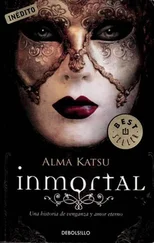“Why not? I’ll buy the tickets, pay for everything. Money is not a problem.”
“I think we should get you to Canada, now, before the police put out a bulletin on you. We’re fifteen minutes from the border.”
“Will you need your passport to cross the border? They’ve changed the regulations, haven’t they?” the girl asks, a note of panic in her voice.
Luke tightens his grip again on the wheel. “I don’t know… I haven’t crossed the border in a while… Oh, okay, we’ll go to my house. But only for a minute.”
The farmhouse stands in the middle of an open field, like a child too stupid to know to come in from the cold. His truck climbs and bucks over the churned mud, now frozen into peaks like cake frosting.
They enter through the back door into a sad, shabby kitchen that hasn’t been changed in the past fifty years. Luke flips on the overhead light and notices it makes no appreciable difference in the level of light in the room. Used coffee mugs sit on the dinette table and crumbs crunch underfoot. He is disproportionately embarrassed by the disarray.
“This was my parents’ house. I’ve been living here since they died,” he explains. “I didn’t like the idea of the farm going to a stranger, but I can’t run it like they did. Sold the livestock a few months ago. Have someone lined up to rent the fields, to plant next spring. Seems a waste to let them go fallow.”
Lanny drifts around the kitchen, running a finger over the chipped Formica countertop, the back of a vinyl-cushioned kitchen chair. She stops at a drawing hanging from a magnet on the refrigerator, made by one of his daughters when she was in preschool. A princess on a pony; the pony is recognizable as some type of horselike creature but the princess is an approximation, with bushy blond hair and blue eyes, wearing a pink gown to go horseback riding. Except for the long gown, it could be Lanny.
“Who drew this? Do you have children at home?”
“Not anymore.”
“Gone, with your wife?” she guesses. “No one taking care of the place for you?”
He shrugs.
“You don’t have any reason to stay,” she says, stating a fact.
“I still have obligations,” he says, because that is how he’s used to thinking about his life. A farm he won’t be able to sell in this economy. He has his practice, mostly elderly as their children and grandchildren move out of town. His caseload shrinks every month.
Luke goes up the stairs and to his bedroom, and finds his passport in the drawer of a bedside table. He moved into his parents’ old bedroom after his wife left him: the bedroom of his childhood had also been his marital bed and he wants no part of that anymore.
He flips the passport open. Never used. He’s never had the time to travel, not since his residency, and even then it was only in the U.S. He’s never been to even one of the faraway places he used to dream about seeing when he was a teenager, spending long hours on the tractor, his daydreaming time. His empty passport makes him feel a little ashamed in front of somebody who has been to all these exotic places. His life was supposed to turn out differently.
He finds Lanny in the dining room inspecting the family pictures, placed on a low bookcase. His mother had the photos out for as long as Luke could remember and he didn’t have the heart to put them away, but his mother was the only one who knew who these people were and how they were related to him. Old black-and-white photographs, with stern, long-gone Scandinavians staring back, strangers to one another. There’s one color picture in a thick wood frame, a photo of a woman and her two daughters nestled among the relatives as though they belong there.
Luke turns off the lights and sets the thermostat very low, just enough to keep the pipes from freezing. He checks the locks on the doors, though he doesn’t know why he is being so careful. He plans to come right back after dropping this girl off over the border, but the touch of his hand on the light switch makes a lump rise in his throat. It feels like he is saying good-bye-which he hopes to do one day, for which he’s planned and pictured in his more sensible moments, maybe in the spring when he can think more clearly-but right now he’s just helping a girl in trouble, a girl with no one else to turn to. As for today, he’s coming right back.
“Ready?” Luke asks, jingling the keys once more, but Lanny reaches into the bookcase and pulls out a small book, barely larger than her hand. The dust jacket is missing and the hard covers are worn at the corners, so that the cardboard is visible, like a bud among the fraying yellow fabric. It takes a minute before Luke recognizes the book: it had been his favorite as a boy and his mother must have kept it all these years. The Jade Pagoda , a classic child’s tale, like Kipling but not Kipling, a British expatriate’s story set in a faraway locale, a story with a Chinese prince and a European princess, or a Caucasian girl in any case, set with pen-and-ink illustrations done by the author’s own hand. Lanny flips through the pages.
“Do you know the book?” he asks. “I used to love it… Well, you can see the use it got. The binding is just about shot. I don’t think it’s in print anymore.”
She is holding it out to him now, open, pointing to one of the illustrations. And he’ll be damned if it isn’t her. She’s in a period dress and her hair is pinned up like a Gibson girl’s, but that is her heart-shaped face and her slightly haughty, bemused eyes. “I met Oliver, the author, when we both lived in Hong Kong. He was just a British civil servant then, and known as a drinker, begging the officers’ wives to pose for his ‘little project,’ as he called it. I was the only one who would do it; they all thought it was scandalous and some kind of ruse, just an excuse to get one of us alone with him in his apartment.”
There’s a stirring in his diaphragm. He feels his heart leap possessively. The girl in the illustration stands before him in the flesh, and it is like the strangest kind of magic to have something he’s known only as incorporeal suddenly manifest itself before him. He is afraid, for a moment, that he might faint.
In an instant, she is at his side, hurrying to the door. “I’m ready. Let’s go.”

ST. ANDREW, 1816
I’d gotten my heart’s one desire-for Jonathan to behold me as a woman and his lover-but nothing more. I lived in a state of uncertainty because I hadn’t been able to communicate with him since that thrilling, frightening afternoon.
Winter had intervened.
Winter was not to be denied in our part of Maine. We would endure blizzard after blizzard, snow piled waist deep within a day or two, negating any possibility of travel. All attention and energy was directed toward keeping warm and fed, and taking care of the livestock. Every common task outdoors required wading in snow, an exhausting prospect. By the time a path to the barn and pasture was cleared, a clearing chopped through the icy surface of the stream for both livestock and household use, and the cattle had gotten used to negotiating the snowdrifts in the field, and it looked as if life might return to normal (or, at least, routine), another storm would descend on the valley.
I sat by the window and stared down the wagon trail, unsullied snow standing nearly two feet deep. I prayed fervently for the snow to settle and become compact enough for us to be able to travel on it, so that we could go to services on Sunday, my only opportunity to see Jonathan. I needed him to assuage my fears, to tell me he had not swived me only because he could not have Sophia but because he desired me. Perhaps because he loved me.
Читать дальше













